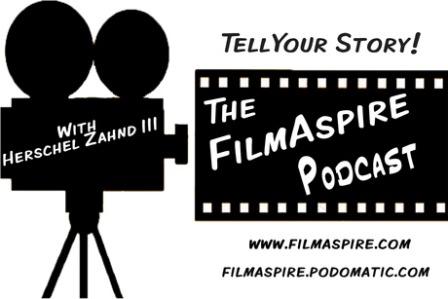I wanted to ask about camera equipment… In one episode you talk about… how you’ll probably need about $2000 worth of equipment, including $800 for a decent starter camera. I was wondering what advice you would give to people who really don’t have that kind of budget.
"What I always tell people is… the technology is coming down the line… You don’t have to buy the best camera in the world… The technology has come down in price and is so accessible that you can actually get into a full HD camera for $800. The camera that I’m shooting on right now cost me $800… It’s a Canon T3I. The T2I is a little less; you can get that camera, which does get all the HD accoutrement, for about $600. You’ve got problems with that in that it doesn’t have good audio. If you’re going to spend money on an indie film, spend money on the audio, because there is nothing that will cause your film to be received poorly quicker than audio. They will forgive bad acting, they will forgive bad editing, they will forgive bad story. People will not forgive bad sound… So you need to get hold of some kind of sound recording gear; you can get an H4N Zoom for about $250…
"Then you need something to edit on. Most of your Mac laptops… are going to come with some kind of an iMovie or basic editing software. You don’t have to get the $1000 Final Cut Pro Suite… The better toys you have, the more polished product you’re going to have – but really, you don’t even need to go to that expense. If you have an iPhone 4, there are some really wonderful films that have been shot and edited on an iPhone…
"Then you have your other camcorders… there are a lot of them that do shoot HD footage. The problem [is] that the technology that’s in some of the more accessible, cheaper HD cameras are going to be fixed focal length cameras… It’s not going to give you that look, that “film” look… The level of your camera dictates the image quality.
"All that being said, I firmly believe that what you shoot your film with is entirely unimportant based on what’s in front of the camera… It doesn’t matter what you’re shooting on; as long as you’re telling a good story, you will find an audience… They will watch it and they will love it… The biggest lesson I’ve learned is you don’t have to have all the gear, all the crew, all the things that everybody says you have to have. You just do it if you have the passion and the story… That’s how I try to teach people to make movies, that’s why FilmAspire exists. I believe that people have stories to tell and they have to tell them."
What filmmakers do you admire?
"Any Steven Spielberg I will watch… I love Scorsese; I love Cecil B. DeMille and Hitchcock. More contemporarily, Tarantino; oddly enough, just about everything except 'Reservoir Dogs'… I love [Robert] Rodriguez… James Cameron. His movies just affect you so much; I can’t watch the end of 'Titanic' without crying… The director that probably has had the most influence on me is Joss Whedon."
If you could give just one big piece of advice to an aspiring filmmaker, the most important thing for somebody to know, what would it be?
"I love being able to say this because it’s backed up by one of the giants. I was at a show this summer with John Carpenter… I really wanted him to do the podcast, but he didn’t have time in his schedule, so I just asked him for a quote… I said, 'What advice would you give a young filmmaker?' and he said, 'Just do it.' The technology is there, it’s accessible; if you want to do it, if you have the passion to do it, go do it."
The FilmAspire Podcast can be found at filmaspire.podomatic.com. Information about Herschel Zahnd and his films can be found at www.renegadeartproductions.com.
Image courtesy of the FilmAspire Podcast website.



